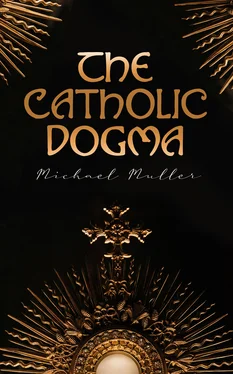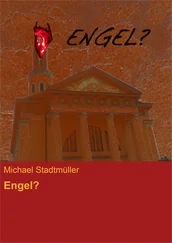Michael Müller - The Catholic Dogma
Здесь есть возможность читать онлайн «Michael Müller - The Catholic Dogma» — ознакомительный отрывок электронной книги совершенно бесплатно, а после прочтения отрывка купить полную версию. В некоторых случаях можно слушать аудио, скачать через торрент в формате fb2 и присутствует краткое содержание. Жанр: unrecognised, на английском языке. Описание произведения, (предисловие) а так же отзывы посетителей доступны на портале библиотеки ЛибКат.
- Название:The Catholic Dogma
- Автор:
- Жанр:
- Год:неизвестен
- ISBN:нет данных
- Рейтинг книги:4 / 5. Голосов: 1
-
Избранное:Добавить в избранное
- Отзывы:
-
Ваша оценка:
- 80
- 1
- 2
- 3
- 4
- 5
The Catholic Dogma: краткое содержание, описание и аннотация
Предлагаем к чтению аннотацию, описание, краткое содержание или предисловие (зависит от того, что написал сам автор книги «The Catholic Dogma»). Если вы не нашли необходимую информацию о книге — напишите в комментариях, мы постараемся отыскать её.
The Catholic Dogma — читать онлайн ознакомительный отрывок
Ниже представлен текст книги, разбитый по страницам. Система сохранения места последней прочитанной страницы, позволяет с удобством читать онлайн бесплатно книгу «The Catholic Dogma», без необходимости каждый раз заново искать на чём Вы остановились. Поставьте закладку, и сможете в любой момент перейти на страницу, на которой закончили чтение.
Интервал:
Закладка:
In showing their erroneous doctrine on Catholic and Protestant belief in Christ, etc., we will chiefly follow the doctrine of St. Thomas Aquinas, and other doctors and eminent theologians of the Church.
"That method of teaching," says Pope Leo XIII., "which rests on the authority and judgment of individual professors, has a changeable basis, and hence arise different and conflicting opinions which cannot present the mind of the holy Doctor (Thomas Aquinas) and foster dissensions and controversies which have agitated Catholic schools for a long time and not without great detriment to Christian Science." (Brief, June 19. 1886). "St. Thomas, indeed, is a most wise doctor, who walks within the confines of truth; who not only never disputes with God, the Head and Fount of all truth, but is always strictly in full accord with Him, and is always docile to Him when disclosing his secrets in any manner whatever; who no less piously listens to the Roman Pontiff when speaking, reveres in him the divine authority; and fully holds that submission to the Roman Pontiff is necessary to salvation. (Opusc. contra errores Graecorum). In following St. Thomas Aquinas as our author and master, we safely teach without any danger of passing over the boundaries of truth. But to gather and scatter opinions according to our own will and pleasure is to be reputed the vilest license, lying, and false science, a disgrace and slavery of the mind." (Encyc., Dec. 21., 1887.)
CHAPTER II.
The Infallible and Only True Guide to Heaven
Table of Contents
Many years ago a celebrated architect built a magnificent palace. When he had completed the costly edifice he gave it to some friends for their dwelling. But, these soon behaved badly, and became a scandal to the whole neighborhood. People often said: "Why was so splendid a palace erected for such wicked wretches?" At last the king arrived and took possession of the palace. He pardoned the servants and tried to make them good again. Then the people said: "Now we understand why this magnificent palace was built; it was for the king."
The architect in this parable is God the Father. He built a magnificent palace - the world. He put into it his friends - Adam and Eve. They soon behaved badly; and the angels asked, "Why was so splendid a palace - the world - created for these wicked people?"
At last the King, Jesus Christ, arrived. He pardoned the servants and tried to make them good again, and the angels exclaimed : "Now we understand why this great palace - the world - was made; it was for Jesus Christ, the King of the world."
God decreed from all eternity to create the world as a dwelling-place for men, where, by a holy life, they should gain an eternal reward. He foresaw from all eternity that men would not live up to the end of their creation. God would then have been frustrated in his design, had he not decreed from all eternity the Incarnation for the redemption of the human race. It was, therefore, principally for the sake of the God-Man that the world was created. He was to come for the justification and glorification of man.
Hence St. Thomas Aquinas says: Ordo naturae creatus est et institutus propter ordinem gratiae.
The principal end of the creation of the universe is, first, Jesus Christ, and, secondly, that the elect may receive here below the grace of God through Christ. Although it is true that the world existed before the Son of God became man, nevertheless, in the plan of creation and redemption, Jesus Christ is prior to the world. On this account St. Paul calls Jesus Christ the beginning, the first-born from the dead, that, in all things, he may hold the primacy: because in him it hath pleased the Father that all fulness should dwell, and through him to reconcile all things unto himself, making peace through the blood of the cross, both as to the things on earth, and the things that are in heaven. (Coloss. i. 18–20.)
There is, therefore, a certain intimate union between the creation of the world and the nativity of Christ. God did not wish that Christ should be born except in this world; and again, he did not wish that this world should exist without Jesus Christ. Nay, it was chiefly for his sake, as we have said, that God created the world and for his sake has preserved it and shall continue to preserve it to the end of time.
God had decreed to institute through him the order of grace, that is, the order of the justification and glorification of the elect.
As the artist produces his work according to his conception and knowledge, so, also, God created man to his own image, which is his Son, his eternal Wisdom, the prototype of all things. Now, when a work of art is deteriorated by time or accident, it is restored by the skilful hand of the artist to its original state; so, in like manner, the image of God in man being disfigured in Adam, its source, the Son of God became man to repair his image. "As the children are partakers of flesh and blood, so Jesus also made himself partaker of the same: wherefore it behooves him in all things to be made like unto his brethren, that he might become a merciful and faithful High Priest before God, and be a propitiation for the sins of the people." (Heb. ii. 14, 17.) Thus we receive our sonship or adoption of children of God from him who is the Son of God by his nature. "And if sons, heirs also of God, and joint-heirs with Christ." (Rom. viii. 17.)
Hence it has always been, from the beginning, absolutely necessary for salvation to know, by divine faith, God as the Creator of heaven and earth and the eternal Rewarder of the good and the wicked, and the Incarnation of the Son of God, and consequently the mystery of the Most Holy Trinity; "For he that cometh to God," says St. Paul, "must believe that he is, and is a rewarder of those who seek him." (Heb. xi. 6.) Upon these words of the great Apostle, Cornelius a Lapide comments as follows:
"The knowledge of God acquired from the contemplation of the world teaches only that God is the Author of the world and of all natural blessings, and that only these natural goods can be obtained and asked of him. But God wishes to be honored and loved by men, not only as the Author of natural goods, but also as the Author of the supernatural and everlasting goods in the world to come; and no one can in any other way come to him and to his friendship, please him, and be acceptable to him. Hence true, divine faith is necessary, because it is only by the light of divine faith that we know God, not only as the Author of nature, but also as the Author of grace and eternal glory; and therefore the Apostle says that to know that there is a God, who rewards the good and punishes the wicked, is to know him as such, not only from natural knowledge, and belief, but also from supernatural knowledge and divine faith.
"But if St. Paul speaks here only of these two great truths, it does by no means follow, that he wishes to teach that the supernatural knowledge of these two truths only and divine faith in them are sufficient to obtain justification, that is, to obtain the grace to become the children of God; but they are necessary in order to be greatly animated with hope in undergoing hard labors and struggles for the sake of virtue. However, to obtain the grace of justification, we must also believe other supernatural truths, especially the mystery of the Incarnation of Christ and that of the Most Holy Trinity." (Comm. in Ep. ad Heb., ix. 6.)
"Some theologians," says St. Alphonsus, "hold that the belief of the two other articles - the Incarnation of the Son of God, and the Trinity of Persons - is strictly commanded but not necessary, as a means without which salvation is impossible; so that a person inculpably ignorant of them may be saved. But according to the more common and truer opinion, the explicit belief of these articles is necessary as a means without which no adult can be saved." (First Command. No. 8.) According to St. Augustine (De Praedest. Sanctorum C. 15.) and other Theologians, the predestination, election, and Incarnation of Christ alone were owing, not to the foreseen merit of any one, not even to that of Christ himself, but only to the good pleasure of God. However, the predestination of all men in general, or the election of some in preference to others, is all owing to the merit of Christ, on account of which God has called all men to life everlasting and gives them sufficient grace to obtain it, if they make a proper use of his grace, especially that of prayer.
Читать дальшеИнтервал:
Закладка:
Похожие книги на «The Catholic Dogma»
Представляем Вашему вниманию похожие книги на «The Catholic Dogma» списком для выбора. Мы отобрали схожую по названию и смыслу литературу в надежде предоставить читателям больше вариантов отыскать новые, интересные, ещё непрочитанные произведения.
Обсуждение, отзывы о книге «The Catholic Dogma» и просто собственные мнения читателей. Оставьте ваши комментарии, напишите, что Вы думаете о произведении, его смысле или главных героях. Укажите что конкретно понравилось, а что нет, и почему Вы так считаете.












